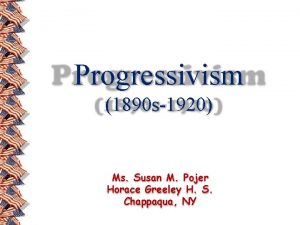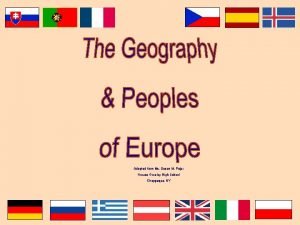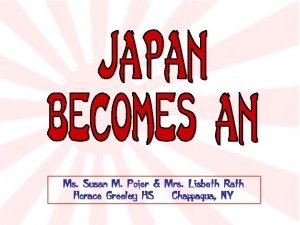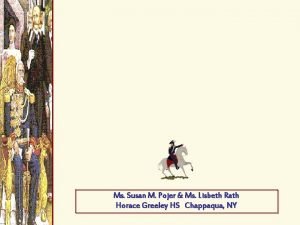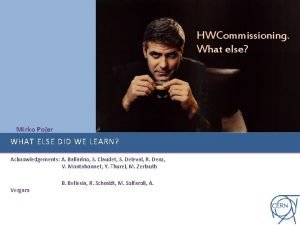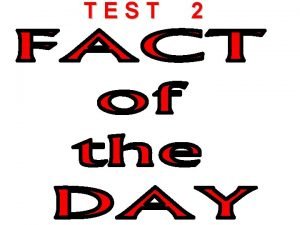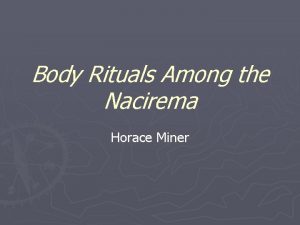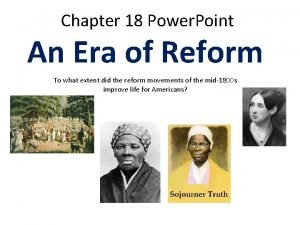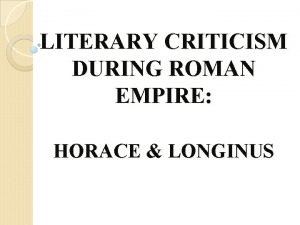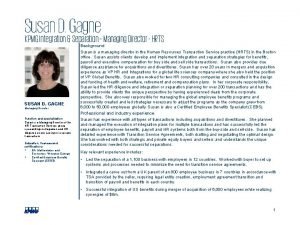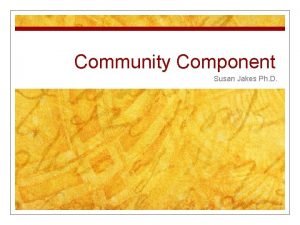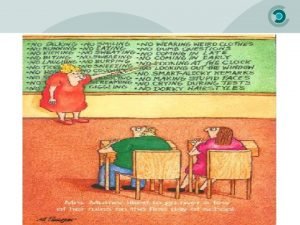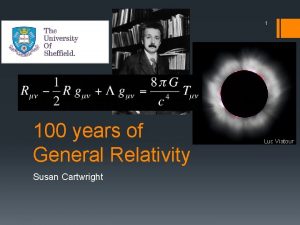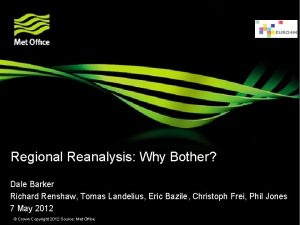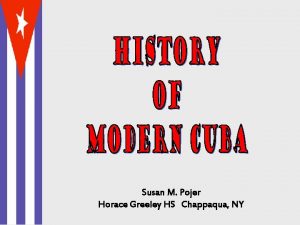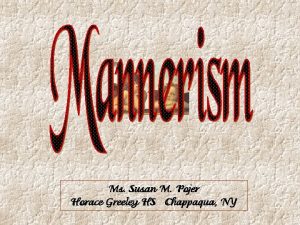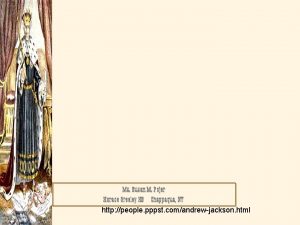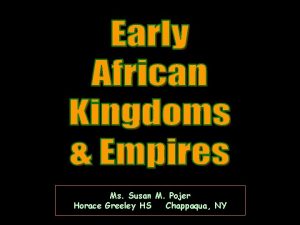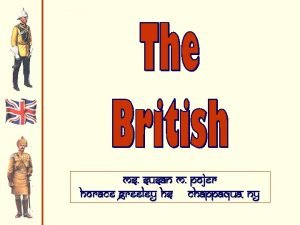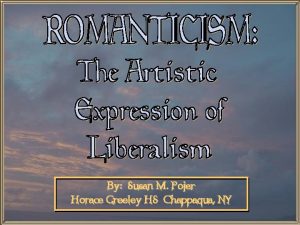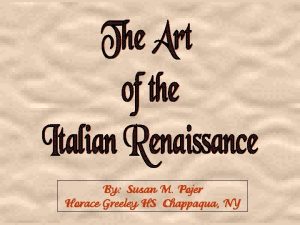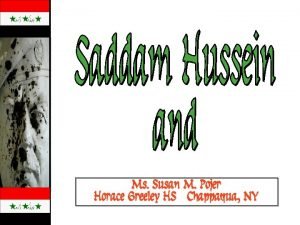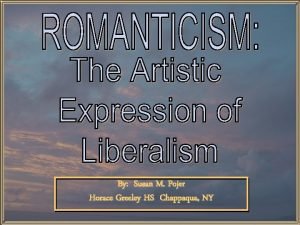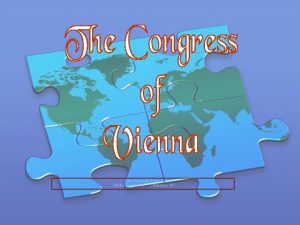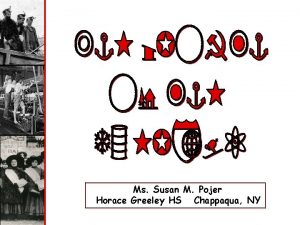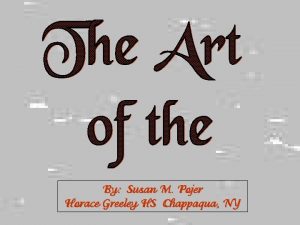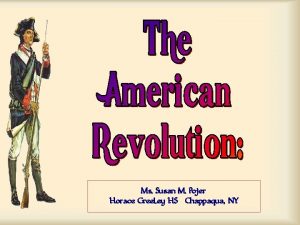Ms Susan M Pojer Horace Greeley HS Chappaqua






![German “Revolutions” [1918] German “Revolutions” [1918]](https://slidetodoc.com/presentation_image/27e4a871f7cd577b338baf6b6f66e536/image-7.jpg)


![The Spartacist League Rosa Luxemburg [1870 -1919] murdered by the Freikorps The Spartacist League Rosa Luxemburg [1870 -1919] murdered by the Freikorps](https://slidetodoc.com/presentation_image/27e4a871f7cd577b338baf6b6f66e536/image-10.jpg)









![Mein Kampf [My Struggle] Mein Kampf [My Struggle]](https://slidetodoc.com/presentation_image/27e4a871f7cd577b338baf6b6f66e536/image-20.jpg)



![Weimar Germany: Political Representation [1920 -1933] Political Parties in the Reichstag May 1924 Dec. Weimar Germany: Political Representation [1920 -1933] Political Parties in the Reichstag May 1924 Dec.](https://slidetodoc.com/presentation_image/27e4a871f7cd577b338baf6b6f66e536/image-24.jpg)



![Benito Mussolini [1883 -1945] Benito Mussolini [1883 -1945]](https://slidetodoc.com/presentation_image/27e4a871f7cd577b338baf6b6f66e536/image-28.jpg)

![March on Rome [1922] March on Rome [1922]](https://slidetodoc.com/presentation_image/27e4a871f7cd577b338baf6b6f66e536/image-30.jpg)

![Lateran Treaty [1929] Lateran Treaty [1929]](https://slidetodoc.com/presentation_image/27e4a871f7cd577b338baf6b6f66e536/image-32.jpg)












![Washington Naval Conference [1921 -1922] 1. Five-Power Treaty – ratio for Warship tonnage 2. Washington Naval Conference [1921 -1922] 1. Five-Power Treaty – ratio for Warship tonnage 2.](https://slidetodoc.com/presentation_image/27e4a871f7cd577b338baf6b6f66e536/image-45.jpg)







![Picasso Studio with Plaster Head [1925] Cubism Picasso Studio with Plaster Head [1925] Cubism](https://slidetodoc.com/presentation_image/27e4a871f7cd577b338baf6b6f66e536/image-53.jpg)
![Georges Braque Still Life Le. Jeur [1929] Cubism Georges Braque Still Life Le. Jeur [1929] Cubism](https://slidetodoc.com/presentation_image/27e4a871f7cd577b338baf6b6f66e536/image-54.jpg)
![Walter Gropius Bauhaus Bldg. [1928] Bauhaus Walter Gropius Bauhaus Bldg. [1928] Bauhaus](https://slidetodoc.com/presentation_image/27e4a871f7cd577b338baf6b6f66e536/image-55.jpg)




![The Great Depression [1929 -1941] London in 1930 Paris in 1930 The Great Depression [1929 -1941] London in 1930 Paris in 1930](https://slidetodoc.com/presentation_image/27e4a871f7cd577b338baf6b6f66e536/image-60.jpg)

![The Great Depression [1929 -1941] The Great Depression [1929 -1941]](https://slidetodoc.com/presentation_image/27e4a871f7cd577b338baf6b6f66e536/image-62.jpg)



- Slides: 65

Ms. Susan M. Pojer Horace Greeley HS Chappaqua, NY

Europe in 1919


From the German Point of View Lost—but not forgotten country. Into the heart You are to dig yourself these words as into stone: Which we have lost may not be truly lost!

Maimed German WW I Veteran

The “Stabbed-in-the-Back” Theory Disgruntled German WWI veterans
![German Revolutions 1918 German “Revolutions” [1918]](https://slidetodoc.com/presentation_image/27e4a871f7cd577b338baf6b6f66e536/image-7.jpg)
German “Revolutions” [1918]

Sparticist Poster

German Freikorps
![The Spartacist League Rosa Luxemburg 1870 1919 murdered by the Freikorps The Spartacist League Rosa Luxemburg [1870 -1919] murdered by the Freikorps](https://slidetodoc.com/presentation_image/27e4a871f7cd577b338baf6b6f66e536/image-10.jpg)
The Spartacist League Rosa Luxemburg [1870 -1919] murdered by the Freikorps

Friedrich Ebert: First President of the Weimar Republic

The German Government: 1919 -1920

The German Mark

The German Mark

The French in the Ruhr: 1923

The French Occupation of the Ruhr

The Beer Hall Putsch: 1923

The Beer Hall Putsch Idealized

Hitler in Landesberg Prison
![Mein Kampf My Struggle Mein Kampf [My Struggle]](https://slidetodoc.com/presentation_image/27e4a871f7cd577b338baf6b6f66e536/image-20.jpg)
Mein Kampf [My Struggle]

European Debts to the United States

The Dawes Plan (1924)

The Young Plan (1930) For three generations, you’ll have to slave away! $26, 350, 000 to be paid over a period of 58½ years.
![Weimar Germany Political Representation 1920 1933 Political Parties in the Reichstag May 1924 Dec Weimar Germany: Political Representation [1920 -1933] Political Parties in the Reichstag May 1924 Dec.](https://slidetodoc.com/presentation_image/27e4a871f7cd577b338baf6b6f66e536/image-24.jpg)
Weimar Germany: Political Representation [1920 -1933] Political Parties in the Reichstag May 1924 Dec. 1924 May 1928 Sep. 1930 July 1932 Nov. 1932 Mar. 1933 Communist Party (KPD) 62 45 54 77 89 100 81 Social Democratic Party (SDP) 100 131 153 143 133 121 120 Catholic Centre Party (BVP) 81 88 78 87 97 90 93 Nationalist Party (DNVP) 95 103 73 41 37 52 52 Nazi Party (NSDAP) 32 14 12 107 230 196 288 Other Parties 102 112 121 122 22 35 23

Monday, April 28, 2014 § Pick up your notebook § Take your seat § Take out your Warm-Ups/Timed Writings Timed Writing Analyze and evaluate the social, political and economic problems faced by the German Weimar Republic in the early 1920’s. Minimum of 2 body paragraphs req. for full credit.

Today’s Agenda § Timed Writing § FN: “Europe in the 1920’s” § Homework: § Finish reading chapter 26 § Complete the chart “Emerging Governments of the Postwar Era”

![Benito Mussolini 1883 1945 Benito Mussolini [1883 -1945]](https://slidetodoc.com/presentation_image/27e4a871f7cd577b338baf6b6f66e536/image-28.jpg)
Benito Mussolini [1883 -1945]

Italian Fasces
![March on Rome 1922 March on Rome [1922]](https://slidetodoc.com/presentation_image/27e4a871f7cd577b338baf6b6f66e536/image-30.jpg)
March on Rome [1922]

Fascist Youth
![Lateran Treaty 1929 Lateran Treaty [1929]](https://slidetodoc.com/presentation_image/27e4a871f7cd577b338baf6b6f66e536/image-32.jpg)
Lateran Treaty [1929]


Ramsay Mac. Donald: 1924, 1929 Labour Party

Stanley Baldwin Conservative Party

1926 General Strike Trades Disputes Act (1927): § All general or sympathy strikes were illegal. § It forbade unions from raising money for political purposes.

Tuesday, April 29, 2014 § Pick up a text book § Take your seat § Take out your homework from last night Warm-Up Discussion In your groups discuss each country on the chart, briefly reviewing the information. 1. What patterns do you see emerging? 2. What do you think this means for post war Europe? Answer each question on the back of your chart in 3 -5 sentences each.

Today’s Agenda § Timed Writing § FN: “Europe in the 1920’s” § Homework: § Terms- Stalin's Soviet Union § Read, mark and annotate Stalin documents § Read Ch. 6 Animal Farm


Raymond Poincaré & the Conservative Right § He sent French troops into the Ruhr in 1923. § Pushed for large-scale infrastructure reconstruction programs [counting on German reparations to pay for them]. § After 1926 -29: • New taxes & tightened tax collections. • Drastic decline in govt. spending that stabilized the franc [the threat of runaway inflation was avoided!]

Edouard Herriot & the French Socialists § 1924 -1926. § Progressive social reform. § Spoke for the lower classes, small businessmen, and farmers. § Committed to private enterprise and private property. § Fervently anti-clerical.


Essential Question How did European countries attempt to keep the peace and develop collective security?

League of Nations Members
![Washington Naval Conference 1921 1922 1 FivePower Treaty ratio for Warship tonnage 2 Washington Naval Conference [1921 -1922] 1. Five-Power Treaty – ratio for Warship tonnage 2.](https://slidetodoc.com/presentation_image/27e4a871f7cd577b338baf6b6f66e536/image-45.jpg)
Washington Naval Conference [1921 -1922] 1. Five-Power Treaty – ratio for Warship tonnage 2. Four-Power Treaty – U. S. France, Britain and Japan agreed to consult w/ each other in the event of a E. Asia crisis before taking action 3. Nine-Power Treaty – marked internationalization of U. S. Open door policy. Recognized Japanese dominance in Manchuria U. S. 5 Britain 5 Japan 3 France 1. 67 Italy 1. 67

The Maginot Line

Locarno Pact: 1925 Austin Chamberlain (Br. ) Aristide Briand (Fr. ) Gustave Stresemann (Ger. ) § Guaranteed the common boundaries of Belgium, France, and Germany as specified in the Treaty of Versailles of 1919. § Germany signed treaties with Poland Czechoslovakia, agreeing to change the eastern borders of Germany by arbitration only.

Locarno Pact: 1925

Kellogg-Briand Pact: 1928 § 15 nations committed to outlawing aggression and war for settling disputes. § Problem no way of enforcement.


George Grosz Grey Day (1921) Da. Da

George Grosz The Pillars of Society (1926) Da. Da
![Picasso Studio with Plaster Head 1925 Cubism Picasso Studio with Plaster Head [1925] Cubism](https://slidetodoc.com/presentation_image/27e4a871f7cd577b338baf6b6f66e536/image-53.jpg)
Picasso Studio with Plaster Head [1925] Cubism
![Georges Braque Still Life Le Jeur 1929 Cubism Georges Braque Still Life Le. Jeur [1929] Cubism](https://slidetodoc.com/presentation_image/27e4a871f7cd577b338baf6b6f66e536/image-54.jpg)
Georges Braque Still Life Le. Jeur [1929] Cubism
![Walter Gropius Bauhaus Bldg 1928 Bauhaus Walter Gropius Bauhaus Bldg. [1928] Bauhaus](https://slidetodoc.com/presentation_image/27e4a871f7cd577b338baf6b6f66e536/image-55.jpg)
Walter Gropius Bauhaus Bldg. [1928] Bauhaus


Essential Question Why did the American stock market crash and the resulting Great Depression impact European Countries?

Causes of the Great Depression • World economy was like a house of cards • U. S. (key card) has 3 weaknesses: – Uneven distribution of wealth – surplus of goods – Investors buy stock on margin

Stock Market Crashes • Black Tuesday - stock market crashed Oct. 29, 1929 – B/C people panic that most stocks were over-valued • 16 million shares sold - most at a huge loss • Global depression results – world trade drops by 65% • Banks and businesses fail; people loose their land homes
![The Great Depression 1929 1941 London in 1930 Paris in 1930 The Great Depression [1929 -1941] London in 1930 Paris in 1930](https://slidetodoc.com/presentation_image/27e4a871f7cd577b338baf6b6f66e536/image-60.jpg)
The Great Depression [1929 -1941] London in 1930 Paris in 1930

German Unemployment: 1929 -1938
![The Great Depression 1929 1941 The Great Depression [1929 -1941]](https://slidetodoc.com/presentation_image/27e4a871f7cd577b338baf6b6f66e536/image-62.jpg)
The Great Depression [1929 -1941]

Decrease in World Trade: 1929 -1932

German Election Results in 1933

The “New Napoleons? ”
 Westward expansion timeline
Westward expansion timeline Horace greeley go west
Horace greeley go west Chappaqua jewish population
Chappaqua jewish population Susan pojer
Susan pojer Susan pojer
Susan pojer Susan pojer
Susan pojer Susan pojer
Susan pojer Susan pojer
Susan pojer Susan pojer
Susan pojer Susan pojer
Susan pojer Susan pojer
Susan pojer Susan pojer
Susan pojer Susan pojer
Susan pojer Susan pojer
Susan pojer Satya tiwari
Satya tiwari Presinkopa
Presinkopa Mirko pojer
Mirko pojer Mirko pojer
Mirko pojer Mirko pojer
Mirko pojer Mirko pojer
Mirko pojer Horatiu poet latin
Horatiu poet latin Poema ars
Poema ars The writer mark twain called the late nineteenth century
The writer mark twain called the late nineteenth century Horace lau
Horace lau Horace morris but mostly dolores
Horace morris but mostly dolores Charm box nacirema
Charm box nacirema Elizabeth cady stanton with my eyes i see
Elizabeth cady stanton with my eyes i see Mistress seema rani
Mistress seema rani Horace hp
Horace hp Horace as a critic
Horace as a critic Horace mann ucla community school
Horace mann ucla community school Dr susan eber
Dr susan eber Moral saints susan wolf
Moral saints susan wolf Holiky
Holiky Susan perlman md
Susan perlman md Susan christoffersen
Susan christoffersen Susan bögels
Susan bögels Susan age 5 has bruises on her upper arm
Susan age 5 has bruises on her upper arm Susan kinard
Susan kinard Susan wouters
Susan wouters Kpmg integration and separation
Kpmg integration and separation Susan jakes
Susan jakes Susan kaspari
Susan kaspari Susan bidel
Susan bidel Not yourself
Not yourself Susan burgoyne
Susan burgoyne Complete the sentences with
Complete the sentences with Susan de bruin
Susan de bruin Susan l. bryant
Susan l. bryant Susan klusmeier
Susan klusmeier Susan kuklin wiki
Susan kuklin wiki Dr susan cartwright
Dr susan cartwright Susan dale barker
Susan dale barker Susan hogan rotunda
Susan hogan rotunda Susan wheeland
Susan wheeland Susan butts
Susan butts Susan schoenian
Susan schoenian Susan reinhard aarp
Susan reinhard aarp Susan langford
Susan langford Susan mains artist
Susan mains artist Vertical
Vertical Susan bladholm
Susan bladholm The talent show by susan wojciechowski
The talent show by susan wojciechowski Susan fennis
Susan fennis Working principle of gi-fi technology
Working principle of gi-fi technology Susan gestin
Susan gestin









